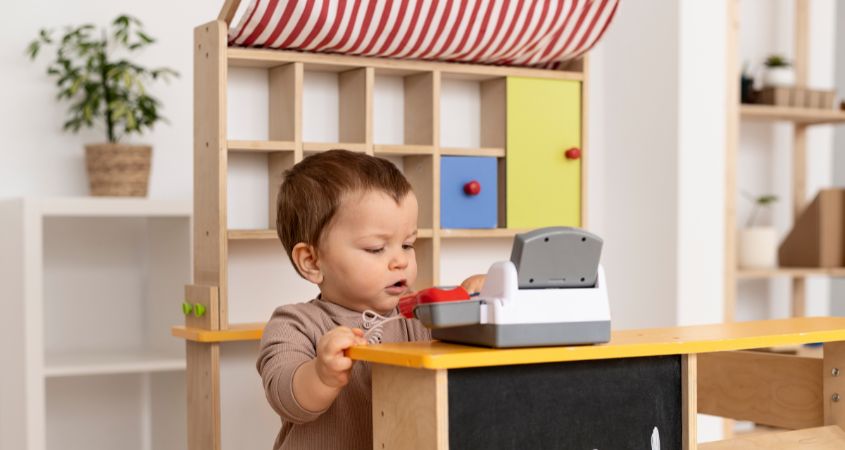At one of the most important moments in our lives—when we become parents and take on the responsibility of caring for and raising a child—one of the toughest decisions we face is choosing between daycare and a nanny. This choice can play a crucial role in shaping the child’s future and the overall comfort of the family.
Each option comes with its own advantages and drawbacks, and making an informed decision requires careful consideration of many factors, including the child’s age, emotional readiness, developmental expectations, and the unique needs of the family.
In this article, we’ll explore the specifics of both options to help you choose the one that best aligns with your personal goals and family priorities.
A child in a kindergarten
Kindergarten provides a shared environment where children can interact with each other and develop social skills. It encourages active learning, independence, and adaptation to new situations.
In preschool, a child receives a structured program that focuses on developing different aspects of his or her personality. This may include cognitive skills, physical activity, social interactions, and emotional development. Professional educators have the experience and knowledge to create a favorable educational environment where a child can reach his or her potential and learn in a group. It should be borne in mind that when choosing a preschool, a child will not have an individual approach.
Contact the Dream Nanny Agency
Why some mums choose daycare for their children
Many mums choose preschool for their children as this educational and developmental option has several advantages. Here are some of them:
- Socialization: Kindergarten gives the child the opportunity to interact with other children of his/her age. In a group environment, the child learns communication, co-operation, and develops social skills. This helps him/her to adapt to the group, interact with the team, and build relationships with different personalities;
- Development of independence: the child is allowed to perform some tasks individually, such as dressing, eating and putting away toys. He gradually learns to cope with simple tasks, which develops his independence and self-discipline;
- Structured educational program: the general culture of the children’s personality is formed, including the values of a healthy lifestyle, the development of their social, moral, aesthetic, intellectual, physical qualities, initiative, independence and responsibility of the child;
- Broadening interests and experiences: the child is given access to a variety of classes and activities such as sports, music, dance, visual arts, etc. This helps to broaden his/her interests, discover his/her talents, and develop new skills. This helps to broaden his/her interests, discover his/her talents and develop new skills;
- Professional teachers: qualified educators who are specially trained to work with pre-school children. They have knowledge and experience in child development and education, and create a favorable and stimulating educational environment for the child.
- Expanded facilities and services: Some preschools offer additional services, such as foreign language classes, sports, swimming, music classes, library visits, etc. This allows children to gain additional knowledge and skills and enrich their experiences;
- Regular meals: proper daily routines are followed, including timetabled meals adapted to children’s needs. This promotes healthy growth and good nutrition.
Choosing a daycare center for your child can be a great step in your child’s development. The child gets the opportunity for socialization, structured education, developing independence and expanding their interests. Professional teachers and additional services make daycare an attractive option for many mums.

Why aren’t all children suitable for day care (исправить)
Daycare is a system your child needs to fit into on an equal footing with other children.
However, daycare may not be right for some children despite the many benefits. Here are certain disadvantages of choosing a day care center for your child:
Adaptation and separate time with parents: For many children, adapting to a new environment in kindergarten can be a complex process. The child may feel anxious and insecure, especially if he or she is not used to being without parents. Adaptation takes more time, and instead of learning new knowledge and exploring the world, the child will overcome internal resistance;
Limited individualized care: educators deal with several children at a time, and individual attention to each child may be limited. Some children lack individualized care, support, and attention, especially if the child has high needs;
- Risk of infections and illnesses: there is a high risk of contracting infectious diseases such as colds, flu, and other viruses in a group environment. At the beginning of the daycare center, children may get sick often until their immune system has adapted;
- limited control over the educational process: the program and teaching methods are set according to common standards and requirements. This may mean that some parents will not have complete control over the content and approaches to their child’s education;
- Schedules and restrictions: The opening hours of the day care center may be inconvenient for some parents. There is often a mismatch between the opening hours of the day care center and the parents. This can cause difficulties in organizing time and caring for the child.
It is important to note that every child is unique, and what works for one may not work for another. When choosing between daycare and other childcare options, it is essential to consider the child’s individual needs and characteristics, as well as family circumstances and preferences.
Average time to close a vacancy 14-21 days
What affects the cost of daycare?
The cost of daycare can be determined by several factors that affect the quality of services provided. Here are some of them:
- qualifications of teaching staff;
- safety of premises, spaciousness, availability of modern repairs;
- the quality of the playground equipment;
- Individualised nutrition tailored to the needs of the children;
- availability of a swimming pool and sports sections;
- Stimulating creative development;
- foreign language training;
- application of early development techniques;
- availability of a video surveillance system.
It is important to note that each preschool has its own characteristics and combination of services that can affect its cost. Parents should carefully examine the services offered and assess whether they meet their needs and financial capacity when choosing a preschool for their child.

A nanny or governess is an alternative option to day care
Choosing a nanny for child development can offer several advantages over daycare. Here are some of them:
- care for the child from birth: a nanny provides comfortable care for the child practically from birth, while kindergarten is usually open from the age of three. This is very convenient for working parents, as the nanny takes care of the baby;
- travelling or business trips: a travel nanny provides round-the-clock care and nurturing for the child in a new environment. This may include organising meals, sleep, entertainment and other activities to keep the whole family comfortable during the trip;
- Parental relief: having a nanny allows parents to have more free time, relax or do other things not directly related to the care of the child. This helps to relieve emotional stress and maintain a balance between personal life and parental responsibilities;
- Personalised attention: the governess works directly with your child, allowing her to give much more attention and care. This creates a favourable environment for identifying each child’s needs and designing an individual development programme tailored to their unique abilities and interests;
- flexible timetable: a personalised educator can create a flexible timetable adapted to the needs of your family directly. She can take into account your child’s particular routines and preferences, including eating, sleeping, playing and activities. This allows the child’s personality potential to be realised more effectively;
- quality and safety control: the involvement of a nanny governess provides greater control over the quality of care and the safety of the child. You can choose a nanny with experience, professionalism and references that meet your requirements. You can also install CCTV or other controls to increase trust in the employee;
- tailoring to individual needs: a more effective approach to the child’s needs, including development, nutrition, education, health and even personality traits. It can work together with parents to develop personal skills;
- developing emotional attachment: creating a warm and emotionally supportive bond. A friendly atmosphere helps to develop the child’s sense of security, self-esteem and emotional stability;
- diversity in learning methodologies: the ability to select and apply modern learning programmes and approaches according to the needs and abilities of your child directly. It can individually create a development plan based on different methodologies to maximise support, development and learning.
Choosing a nanny governess will provide your child with individualised attention, support and optimal developmental opportunities. Unlike daycare, this approach is more personalised, which is especially valuable for families who want to provide the best developmental environment for their children.
Fill in the application form with the requirements for the future nanny
No advances or prepayments until candidates are interviewed
 Find a nanny
Find a nanny

Why are some mums afraid of hiring a nanny?
Despite the benefits of hiring a nanny, some mums may have certain concerns or fear of hiring a nanny. Here are some disadvantages or reasons why some mums may feel anxious:
- trust and safety: one of the main concerns is the issue of trust and safety. Mums worry about how trustworthy the nanny will be and how she takes care of the child. Doubts arise because of possible unfair treatment of the child, lack of professionalism or negligent fulfilment of duties;
- compliance with parenting standards: there are concerns that the nanny may not meet expectations in the child’s nurturing and developmental processes. Differences in attitudes and values with parents sometimes cause concern about what principles are being passed on to the child;
- control and monitoring: some parents find it difficult to control the nanny’s work, especially if they work in an office. They worry that the nanny will not follow instructions, will not cope with possible unusual situations or will not provide the necessary level of care and attention;
- Conflict and communication: sometimes there are conflicts or communication problems. Differences in educational methods, value systems, lack of understanding or difficulties in communication create tension in relationships;
psychological barrier: fear of allowing a stranger into the personal space, which may cause jealousy, guilt, mismatch of worldviews, imposition of unnecessary advice, suppression by authority, possible competition for leadership;
- financial costs: there is a misconception that a nanny governess is a more expensive option than a kindergarten. Parents worry about the family budget and refuse to look for a helper;
- substitution problems: if the nanny falls ill, leaves or is temporarily unable to take care of the child, the mother has difficulties in replacing her child quickly and ensuring continuity of care.
It is important to note that every family’s needs are unique and the disadvantages of finding a nanny are solved through quality matching. It is important to agree on clear rules and open communication at the initial stage, trust and trusted references.
What affects the cost of a nanny governess?
The price depends on several factors that affect her salary level:
- qualifications, certificates and accreditation;
- Experience, length of service and availability of references;
- age and number of children in the family;
- knowledge of foreign languages;
- personal qualities and additional professional skills;
- responsibilities and work schedule;
- terms of the labour agreement;
- accompanying a child abroad;
- driving licence and driving experience;
- Compensation and reimbursement policy.
It is important to note that the cost of a nanny governess service differs depending on location, market conditions and the individual requirements of each family. It is recommended to interview potential candidates and discuss all conditions and expectations, including the level of payment, before making a decision.
Daycare is good, but a nanny is better!
Although the cost of a nanny may be higher, the results and benefits of this choice are felt after only a few months. The quality of care and the individual attention it provides have a positive impact on the child’s development and well-being.
When choosing a nanny – governess, parents have two main options: searching on their own or trusting professionals who specialise in nanny selection. Both options have their advantages, but it is worth considering some factors that will help in making a decision.

Entrust your nanny search to professionals
Entrust your nanny search to professionals
Finding a truly trusted nanny is a demanding process that requires time, patience, and professional insight. Parents must search, interview, check references perform background checks, and navigate every stage of recruitment on their own. While it may seem cost-effective to rely on personal contacts or accept someone at a lower rate, in fact most families simply do not have the expertise to evaluate a nanny’s skills, qualifications, and reliability with confidence.
By contrast, partnering with a professional nanny recruitment agency offers families clear advantages. Our specialists bring years of experience, refined methodologies, and deep knowledge of the childcare sector. Every candidate is rigorously assessed through structured interviews, reference verification, and background checks. Only the most suitable profiles are presented, ensuring that families save valuable time and make well-informed decisions with peace of mind.
Finding a nanny through a dedicated nanny and governess agency also guarantees discretion, security, and the highest professional standards. Parents receive a carefully curated shortlist of vetted candidates whose skills and personalities match the family’s unique needs. This thoughtful process allows you to focus on your family and career, while knowing your child is in the safe hands of an experienced and thoroughly evaluated professional.


Latest posts
-

Treatment of chickenpox in children
How to quickly cure a child without complications
-

Does the nanny have to love the child?
The Role of a Nanny in a Family for the Formation of Attachment
-

Innovative teaching methods
How to get a professional education as a nanny-governess
-

How to successfully select a nanny and create a harmonious relationship with her
Practical tips on how to find and successfully work with a nanny







